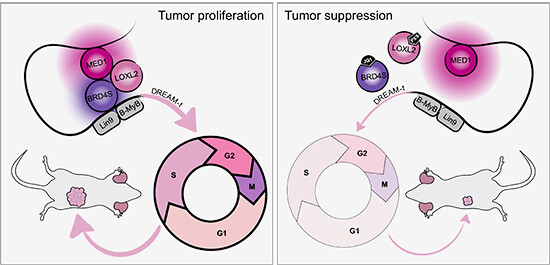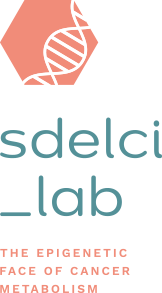



Our lab at the Centre for Genomic Regulation together with collaborators from the Vall d’Hebron Institute of Oncology has made an important discovery that could lead to new treatments for triple-negative breast cancer. This aggressive form of breast cancer lacks the receptors targeted by current drugs and has a poor prognosis.
We found that the enzyme LOXL2 drives the growth of triple-negative breast cancer cells. Further analyses showed LOXL2 expression predicts the effectiveness of drugs targeting the cancer-promoting protein BRD4. This suggested LOXL2 and BRD4 might interact to promote cancer growth. We demonstrated that LOXL2 binds to BRD4 in the nucleus, altering gene expression in a way that spurs triple-negative breast cancer cell growth. Simultaneously inhibiting both proteins disrupted their interactions and slowed cancer growth in cell cultures and mouse models.
Our findings reveal a new mechanism driving triple-negative breast cancer that can potentially be targeted for treatment. A dual-inhibitor strategy against LOXL2 and BRD4 could make triple-negative breast cancer more treatable when combined with other therapies.
More work is needed before patients benefit from our discovery. But progress in understanding this aggressive cancer’s growth mechanisms is encouraging. As we continue shedding light on triple-negative breast cancer biology, its health challenges may become more surmountable than previously thought.
Read the original publication at EMBO Molecular Medicine.
Read the CRG/VHIO press release in English, Spanish or Catalan.
A cool painting depiction of the project, which unfortunatley did not get selected for the cover. Credits to Mariangela Corsetti.
| Cookie | Duration | Description |
|---|---|---|
| cookielawinfo-checbox-analytics | 11 months | This cookie is set by GDPR Cookie Consent plugin. The cookie is used to store the user consent for the cookies in the category "Analytics". |
| cookielawinfo-checbox-functional | 11 months | The cookie is set by GDPR cookie consent to record the user consent for the cookies in the category "Functional". |
| cookielawinfo-checbox-functional | 11 months | The cookie is set by GDPR cookie consent to record the user consent for the cookies in the category "Functional". |
| cookielawinfo-checbox-others | 11 months | This cookie is set by GDPR Cookie Consent plugin. The cookie is used to store the user consent for the cookies in the category "Other. |
| cookielawinfo-checkbox-advertisement | 1 year | The cookie is set by GDPR cookie consent to record the user consent for the cookies in the category "Advertisement". |
| cookielawinfo-checkbox-necessary | 11 months | This cookie is set by GDPR Cookie Consent plugin. The cookies is used to store the user consent for the cookies in the category "Necessary". |
| cookielawinfo-checkbox-performance | 11 months | This cookie is set by GDPR Cookie Consent plugin. The cookie is used to store the user consent for the cookies in the category "Performance". |
| viewed_cookie_policy | 11 months | The cookie is set by the GDPR Cookie Consent plugin and is used to store whether or not user has consented to the use of cookies. It does not store any personal data. |
| Cookie | Duration | Description |
|---|---|---|
| _ga | 2 years | This cookie is installed by Google Analytics. The cookie is used to calculate visitor, session, campaign data and keep track of site usage for the site's analytics report. The cookies store information anonymously and assign a randomly generated number to identify unique visitors. |
| Cookie | Duration | Description |
|---|---|---|
| _ga_F3JJLHN009 | 2 years | No description |

